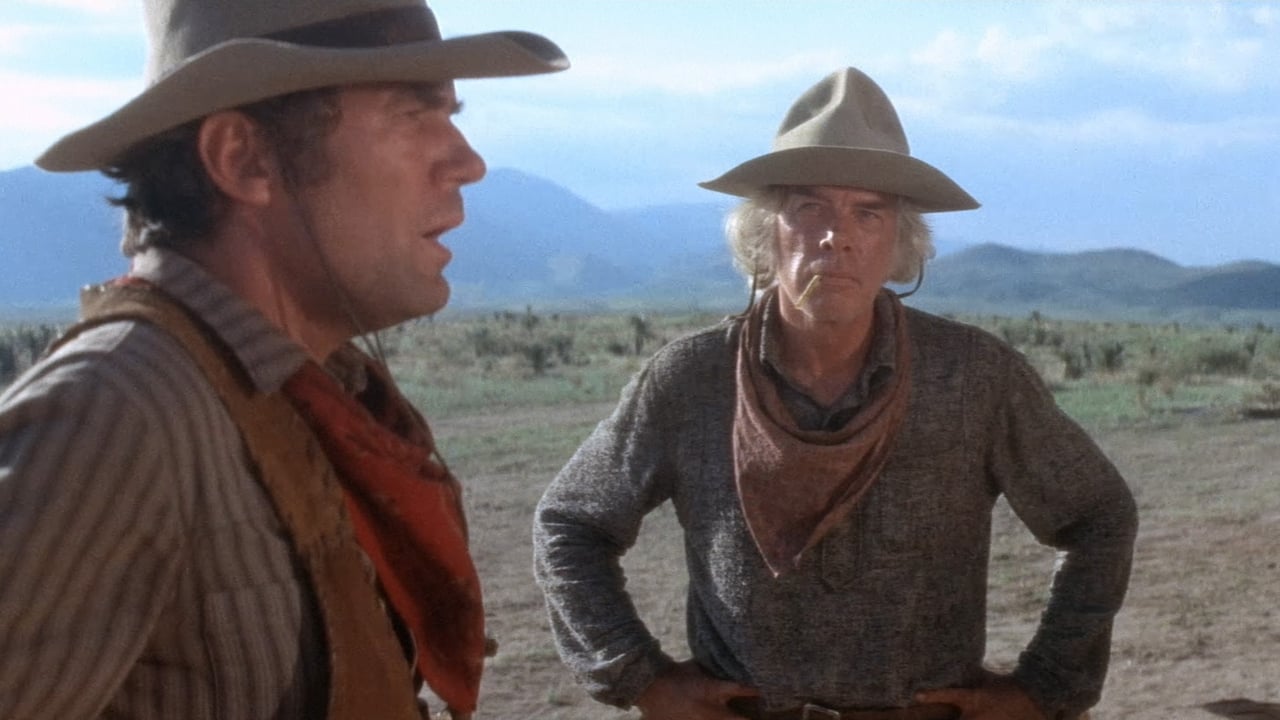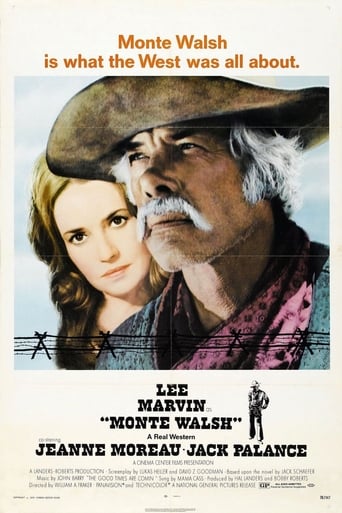

A Brilliant Conflict
... View MoreGreat story, amazing characters, superb action, enthralling cinematography. Yes, this is something I am glad I spent money on.
... View MoreExactly the movie you think it is, but not the movie you want it to be.
... View MoreThere's a more than satisfactory amount of boom-boom in the movie's trim running time.
... View MoreA 'realist' western which means it's about the death of the 'Old West' and its cowboys are no longer young men. Its title character is played by Lee Marvin, (he was 46 when it was made), and his partner is Jack Palance, (who was 51), and the woman Monte loves is a French whore, (a lovely understated Jeanne Moreau). There is very little in the way of conventional action or plot, (a gunfight in the rain, a town almost wrecked by an untamed horse). This is an observational western chronicling a lifestyle that no longer seems relevant. It's gorgeously shot in widescreen by David M Walsh, making great use, not just of the landscape, but of the elements and is beautifully directed by the underrated William A Fraker. I think it's something of a small classic.
... View MoreI waited a long time to see 'Monte Walsh', from having seen the trailer when it first came out & thinking it did not look all that good. Over the years I kept hearing tales about it's qualities and had to take a look.The first half had the look and feel of a 70's John Wayne punch 'em up western without the Duke anywhere to be found. I almost gave up till it took an unexpected turn towards the profound. Perhaps if this film's screenplay writers had stuck a little closer to Jack (Shane) Schaefer's original writing, it might have told it's story of the last days of the American west more convincingly. The marvelous French Jeanne Moreau tries hard to make her character's sorry life believable but I'm feeling she may have thought the role a little below her best interests. Her character, as Monte's long time 'girlfriend' (with a shady past time) actually gives this film it's most tragic moments - she brings this story to it's ultimate finale. Marvin as Monte, has some effective moments but the screenplay wavers too much between slapstick and tragedy, letting both he and the always reliable Jack Palance down. A spectacular but overly grotesque horse breaking scene in the last half looks more like an attempt at lifting the films otherwise deliberate pace. Some good elements unfortunately don't add up to an entirely satisfying story about the dying lifestyle of the west. Ex director of photography William Fraker tries his hand at his first directorial effort and John Barry's score adds some class to an otherwise 'should have been better' movie.A few reviewers tend to like this effort, and if you enjoy 70s American westerns this could entertain you. The available DVD is of good visual quality and that always helps.....KenR
... View MoreIt begins as a comedy about committed cow punchers then turns dramatic as the old way of life begins to dry up and the cowboys have to adapt to changing circumstances. Nothing much new there. But in fact it has its innovative moments despite its overall derivative tone.It owes a lot to the success of "Butch Cassidy and the Sundance Kid," an enormous success released the year before. "Butch" was about the end of the Old West's outlaw culture, while this is about cattle drives. "Butch" had a silly pop tune, "Raindrops Keep Falling On My Head." This one has Mama Cass singing, "The good times are coming. They're coming real soon. And I'm not just pitching pennies at the moon." You will be forgiven for noting a family resemblance.Lee Marvin is decked out in the semi-army campaign hat he and his directors seemed to favor at the time -- "The Professionals", for instance. And Marvin gets one weird arrangement of facial hair after another, each making him look more, well, monumental than the one before. That notion may have come from the director, William Fraker, who was Director of Photography on Marvin's earlier "Paint Your Wagon," where he also sported highly sculpted mutton chops.Fraker's photography was usually quite good, as it was, for instance, in "Bullet." His direction isn't bad either. Having Marvin as the star helps enormously. He was at the top of his game in 1970. He seemed to be sober throughout. Ten years earlier, in a Western episode of "The Twilight Zone," he showed up drunk, crashed his horse backwards through a store window and fell off. (He apologized later.) He crashes a bucking horse through a store window here too, but this time it's the horse's idea. And what a bucking horse it is. He takes Marvin on a roller coaster tour of a Western town at night and demolishes half of it. In fact, there is some splendid horseback riding on evidence throughout the film -- and I say this from a position of complete ignorance about what constitutes splendid horseback riding.As I said, it becomes dramatic after the scenes of drunkenness and diarrhea. Marvin's girl friend, Jeanne Moreau, passes away. One of his friends drops out of cowboyhood and becomes the proprietor of the despised hardware store. Another goes bad, begins robbing banks, and must be killed reluctantly in a final shoot out. The conflict takes place in a cattle yard but the two adversaries don't run around shooting wildly at one another. If a bullet plunks into the planks an inch from Marvin's head, he doesn't even duck. He keeps walking slowly along. And his adversary doesn't challenge him long before putting up his pistol and allowing himself to be shot by Marvin, as a kind of penance. Heavy duty penance. There's a brief shot of Marvin returning to a town where he's had some raucous good times with old friends. He opens the door to the saloon. The large hall is as empty of people as it is of pity. After a long pause, Marvin slowly closes the door and walks away. I wonder if it requires a certain age, a certain accumulation of experience, to appreciate the melancholy of this scene. Anybody familiar with Edward Arlington Robinson's poem, "Mr. Flood's Party"?The point of view -- the fading of the traditional cowboy way of life -- combines sociology and character analysis. Things are changing. Superorganic things over which no individual has control. You can't stop economic evolution anymore than you can stop the stifle the syrinxes of all those who are Tweeting and Chirping and Cawing. Yet adaptation takes different forms. Jack Palance can quit and manage a store. Mitch Ryan quits and robs banks. Lee Marvin winds up wandering alone and half-mad through the mesquite, telling long, rambling tales to a horse that seems to have heard them all before. "There was not much that was ahead of him, And there was nothing in the town below -- Where strangers would have shut the many doors That many friends had opened long ago."
... View MoreWilliam A. Fraker's "Monte Walsh" is another bit of autumn Here commemorated is the end of the cattle demand, and its key personality Nothing in terms of Westerns can be deplorable than that Blessed with the best of beginnings, a novel by Jack Schaefer, who gave a similar sound basis for "Shane," this depressed, impressive picture is a requiem for the cowboy... The cowboy superfluous and looking for a shop-keeping job; big business moving in from the East to rationalize; a cow town with an air of an early stage ghost town Any cowhand worth his coffee and beans could be forgiven for providing the thought: far better to go out in gun-blaze like the "Wild Bunch."There are violent happenings in "Monte Walsh," which had Arizona locations, but not violent-spectacular Controlled melancholy covers them as it does everything else Two grizzled characters, Lee Marvin and Jack Palance, who have both known better cow-punching times, ride into Harmony, another distant relative of the town portrayed in "Shane," and think themselves lucky to get jobs on an old ranch Among the new ranch hands is Mitch Ryan, who is determined to break a wild gray stallion The rheumy eye of Marvin still takes expert note Relaxation for the two aging cowboys consists of a saloon-gal for Marvin (Jeanne Moreau, making both her U.S. and Western debut) and a widow (Allyn Ann Mclerie) with a hardware store for Palance, who ultimately makes a choice for marrying the store owner The film is a realistic Western developed in an unhurried style with the emphasis on character and on the real drudgery of frontier life
... View More